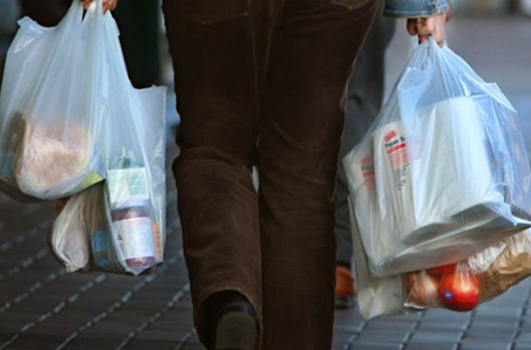Sue Mitchell
August, 28 2018
AFR

Shoppers have struggled to adjust to the ban on single-use plastic bags, prompting Coles to backflip and offer free reusable bags until August 29. Dallas Kilponen
Plastics manufacturer John Norman has an interesting take on the plastic bag brouhaha that has crunched sales at Woolworths and created a public relations nightmare for Coles.
“I live above a supermarket and I constantly forget to take bags,” said Mr Norman, who runs plastic bag manufacturer Churchill & Coombes in the Sydney suburb of Silverwater.
He has sympathy for shoppers who are struggling to adjust to the ban on single-use plastic bags – “we’re creatures of habit … it’s an emotional issue for people”, he said.
But Mr Norman believes Coles’ decision to hand out free reusable plastic bags for almost two months after banning single-use bags on July 1 is less about soothing angry shoppers and more about getting under the skin of arch rival Woolworths.
“I think Coles are trying to irritate Woolworths by giving away free bags,” he said.
Advertisement
Woolworths’ same-store supermarket sales have grown at a faster rate than Coles’ for seven consecutive quarters. But Woolworths same-store sales growth slowed to 1.3 per cent in July and August compared with 4.9 per cent in the first quarter 2018, even though a recent customer survey showed 75 per cent of Woolworths customers supported the bag ban.
“Woolworths customers are saying one thing and doing another,” said Deutsche Bank analyst Michael Simotas. “Customer metrics are suggesting Woolworths is continuing to please its customers but at the margin they are cross shopping to chase free plastic bags and toys.”
Woolworths chief executive Brad Banducci admitted the ban on single-use bags had been more “painful” than expected, with Australians taking longer to adjust than in countries and states where they were removed years ago.
“It was and has been a more painful adjustment than we thought, and out of line with what we’ve seen in South Australia, Tasmania, UK, France, South Africa,” Mr Banducci said.
Customers put fewer items in their baskets if they forgot to bring a reusable bag and packing reusable bags in various shapes and sizes took longer than expected, creating delays at the checkout and forcing Woolworths to deploy more staff.
“So it has been quite painful. Our experience in our pilot stores is that it does take somewhere around eight to 10 weeks for customers to adjust to the new world, and we’re starting to see that happen,” Mr Banducci said.
Outgoing Coles managing director John Durkan said the supermarket chain experienced similar problems, prompting Coles’ decision to extend the offer of free reusable plastic bags from mid-July to August 29.
“It takes some customers longer to get used to bringing in their own bags,” Mr Durkan told investors.
What Mr Durkan didn’t mention was that frustrated customers were taking it out on staff. The verbal abuse reached a point where the shop assistants union launched a national “Don’t Bag Retail Staff” campaign.
Coles has ruled out extending the free bag offer again and is hoping that sales don’t fall off a cliff when it starts charging for reusable plastic bags from Thursday.
“Coles has always maintained that complimentary bags were an interim measure to help customers make the transition to reusable bags, and complimentary bags will no longer be offered after Wednesday August 29,” a spokeswoman said.
However, Coles has extended its Little Shop promotion, which was originally due to finish on August 28, until the end of September in an attempt to maintain strong momentum ahead of a shareholder vote on Wesfarmers’ $20 billion demerger proposal in November.
Single-use bags are now banned at supermarkets in Queensland, Western Australia, South Australia, Tasmania, ACT and the Northern Territory. Victoria plans to ban them by the end of 2019, leaving NSW the only state that hasn’t legislated against their use.
Mr Norman says the bag ban hasn’t had a significant impact on his business, which products 240 tonnes of plastic bags a year, mainly for the food and pharmaceutical sectors. Single-use “singlet” bags used by supermarkets only account for 2 or 3 per cent of sales and are imported from Asia.
“If anything we’ve seen a tiny tick up in sales of thicker reusable bags,” he said. “Everyone is having to adapt.”
Subscribe to our free mailing list and always be the first to receive the latest news and updates.
